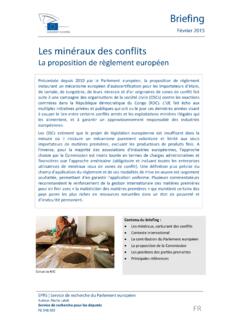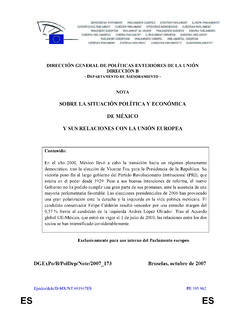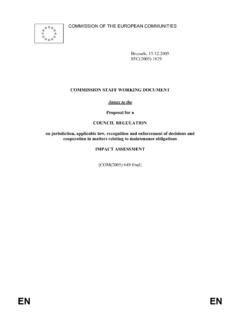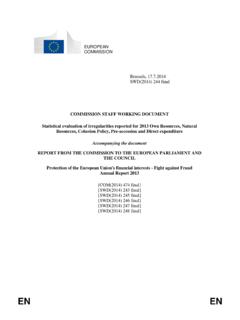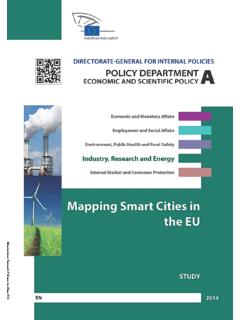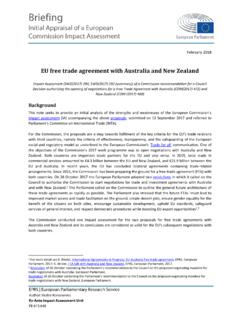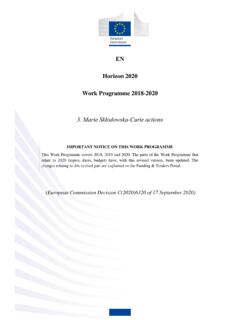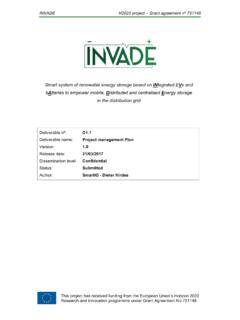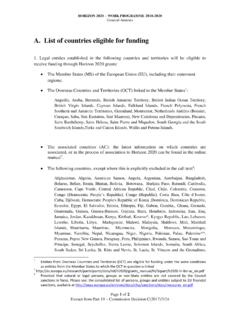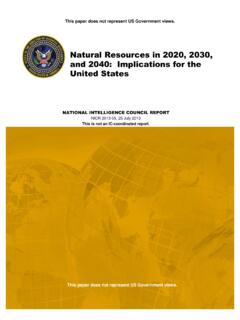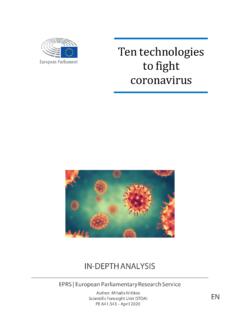Transcription of Digital sovereignty for Europe - European Parliament
1 BRIEFING EPRS Ideas Paper Towards a more resilient EU EPRS | European Parliamentary Research Service Author: Tambiama Madiega PE - July 2020 EN Digital sovereignty for Europe SUMMARY There is growing concern that the citizens, businesses and Member States of the European Union (EU) are gradually losing control over their data, over their capacity for innovation, and over their ability to shape and enforce legislation in the Digital environment. Against this background, support has been growing for a new policy approach designed to enhance Europe 's strategic autonomy in the Digital field. This would require the Union to update and adapt a number of its current legal, regulatory and financial instruments, and to promote more actively European values and principles in areas such as data protection, cybersecurity and ethically designed artificial intelligence (AI).
2 This paper explains the context of the emerging quest for ' Digital sovereignty ', which the coronavirus pandemic now seems to have accelerated, and provides an overview of the measures currently being discussed and/or proposed to enhance European autonomy in the Digital field. Context The notion of 'technological' or ' Digital sovereignty ' has recently emerged as a means of promoting the notion of European leadership and strategic autonomy in the Digital field. Strong concerns have been raised over the economic and social influence of non-EU technology companies, which threatens EU citizens' control over their personal data, and constrains both the growth of EU high-technology companies and the ability of national and EU rule-makers to enforce their In this context, ' Digital sovereignty ' refers to Europe 's ability to act independently in the Digital world2 and should be understood in terms of both protective mechanisms and offensive tools to foster Digital innovation (including in cooperation with non-EU companies).
3 In this context, Ursula von der Leyen, President of the European Commission, has identified Digital policy as one of the key political priorities of her 2019-2024 term in office and pledged that Europe must achieve 'technological sovereignty ' in critical areas. A recent Commission report highlighted that competition from global tech-driven players which do not always obey European rules and fundamental values, and which put data appropriation and valuation at the heart of their strategy, constitutes a major policy challenge for Europe . The European Parliament has expressed deep concern about the security threats connected with growing Chinese technological presence in the EU and has called for possible action at EU level to reduce such dependence. The European Council has stressed that the EU needs to go further in developing a competitive, secure, inclusive and ethical Digital economy with world-class connectivity, and has called for special emphasis to be placed on data security and on artificial intelligence (AI) issues.
4 In parallel, the coronavirus pandemic which hit the EU in spring 2020 showed the essential role played by the high-tech sector in ensuring the continuity of social life, businesses and administrations and has accelerated the reflection on the need for sovereign Digital technologies. In its roadmap for recovery, the European Council called for action to ensure the strategic autonomy of the EU in a post-pandemic context and stressed that investing in Digital capacities, infrastructure and technologies will be a key element of the recovery effort. EPRS | European Parliamentary Research Service 2 Digital sovereignty : State of play The influence of non-EU tech companies has become a concern for EU policy-makers, especially with regard to their impact on the EU's data economy and innovation potential, on EU privacy and data protection and on the establishment of a secure and safe Digital environment.
5 EU data economy and innovation Concerns In the last decade, a range of innovations such as 5G, artificial intelligence (AI), cloud computing and the internet of things (IoT) have become major strategic assets for the EU economy. With a worldwide market for new Digital technologies expected to reach trillion by 2025, a large part of Europe 's growth potential resides in Digital While, the EU has strong assets, including a world-leading AI research community and a strong industry, some indicators show that the EU also exhibits some weaknesses that are detrimental in the global race to develop such new technologies. In the area of AI, for instance, the EU is lagging behind the United States (US) and China in private investment4 and the level of adoption of AI technologies by companies and by the general public is comparatively low compared to the The US also attracts more AI talent and researchers and is the world leader in patent applications, while China leads the race on data collection and data access ( the raw material for most AI technologies)
6 And has made significant progress in developing new hardware equipment such as Furthermore, the US and China are leading in regards patents on quantum-computing technologies, while Europe 's level of investment in blockchain technologies and IoT is comparatively Against this background, EU policy-makers have identified a potential dependence on foreign technology as presenting a risk to Europe 's The coronavirus crisis further highlights this risk, as telecommunications and big data analysis techniques are increasingly used for tracking and controlling the spread of the disease, and AI and high performance computing are expected to come into play for developing strategies for testing and finding vaccines. The crisis also reveals Europe 's urgent need to foster digitalisation in a variety of sectors, ranging from health to retail and from manufacturing to education.
7 Main EU actions so far The EU has put several instruments in place to narrow the investment gap. horizon 2020 , the EU research and innovation programme with nearly 80 billion of public funding to disperse over seven years (2014 to 2020) makes such funding available for research on key Digital technologies such as nano-electronics, photonics, robotics, 5G, high-performance computing, big data, cloud computing, and AI. Other instruments, such as the 5G-PPP, a new Artificial Intelligence and Blockchain Investment Fund, and a large-scale research initiative to foster the development of a competitive quantum industry in Europe , support companies working in the AI and blockchain sectors. Figure 1 Boom in AI patents Source: WIPO Technology Trends Report 2019. Digital sovereignty for Europe 3 In parallel, EU policy-makers are designing measures to adapt EU industrial and technological capacity to the competitive environment.
8 The European data strategy adopted in February 2020 lays down a path towards the creation of European data spaces to ensure that more data becomes available for use in the economy and society, while keeping companies and individuals in control of their data. Furthermore, the EU has adopted an approach for developing AI technologies that adhere to high ethical standards with the aim of becoming a global leader in responsible and trustworthy AI and providing European developers and manufacturers with a competitive advantage ( with consumers and users ultimately favouring EU-compliant products) to catch up with the US or China in the race to develop Furthermore, additional reflection is currently under way to address the opportunities and challenges of AI for the EU in the context of global competition.
9 Privacy and data protection Concerns Technology companies are collecting massive amounts of personal data and the economic model used by Google, Apple, Facebook, Amazon and Microsoft sometimes referred to as the 'GAFAM' is largely based on the collection and exploitation of online users' data to generate advertising The Cambridge Analytica scandal illustrated how online platforms are also able to extract personal data for political profiling purposes. These trends, often referred to as surveillance capitalism, ultimately result in European citizens gradually losing control over their personal information and privacy. Concern has grown in the EU as to how European citizens can recover control of their Digital data (or 'trace') in an online environment that is now largely dominated by non-EU tech companies.
10 A recent example is the controversy concerning the development of contact-tracing solutions for controlling the spread of coronavirus. The technological choices made by Apple and Google have frustrated the ability of some Member States to design their own contact-tracing solutions (such as 'Stop Covid' in France) and fuelled the quest for Digital In a post-coronavirus pandemic world, where technology will no doubt play a more crucial role, the challenge remains for EU policy-makers to find the right balance between control and privacy rights while, as stated by Commission Vice-President Margrethe Vestager, EU citizens want to trust technology when they use it and not begin a new era of surveillance. Main EU actions so far The EU has adopted a very stringent framework for privacy and data protection, with the General Data Protection Regulation (GDPR) at its centre, and has introduced a protective 'right to be forgotten' and a data portability right to enhance individuals' control of their own data.




